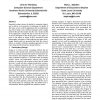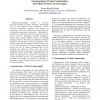47 search results - page 9 / 10 » An Empirical Activity Model for WLAN Users |
SIGCSE
2002
ACM
13 years 5 months ago
2002
ACM
Empirical evidence shows the ability for computer technology to deliver on its promises of enhancing our quality of life relies on how well the application fits our understanding ...
COMPUTER
2007
13 years 5 months ago
2007
and therefore should be implemented outside the sensory-motor system. This way, meaning for a concept amounts to the content of a symbolic expression, a deļ¬nition of the concept ...
HICSS
2006
IEEE
13 years 11 months ago
2006
IEEE
Gatekeeping/Information Control is exercised frequently and daily in virtual communities. Gatekeeping exists in four different levels: Regulators, service providers, communitiesā...
SSD
2001
Springer
13 years 9 months ago
2001
Springer
Like people who casually assess similarity between spatial scenes in their routine activities, users of pictorial databases are often interested in retrieving scenes that are simil...
KDD
2004
ACM
14 years 5 months ago
2004
ACM
We present and empirically analyze a machine-learning approach for detecting intrusions on individual computers. Our Winnowbased algorithm continually monitors user and system beh...


